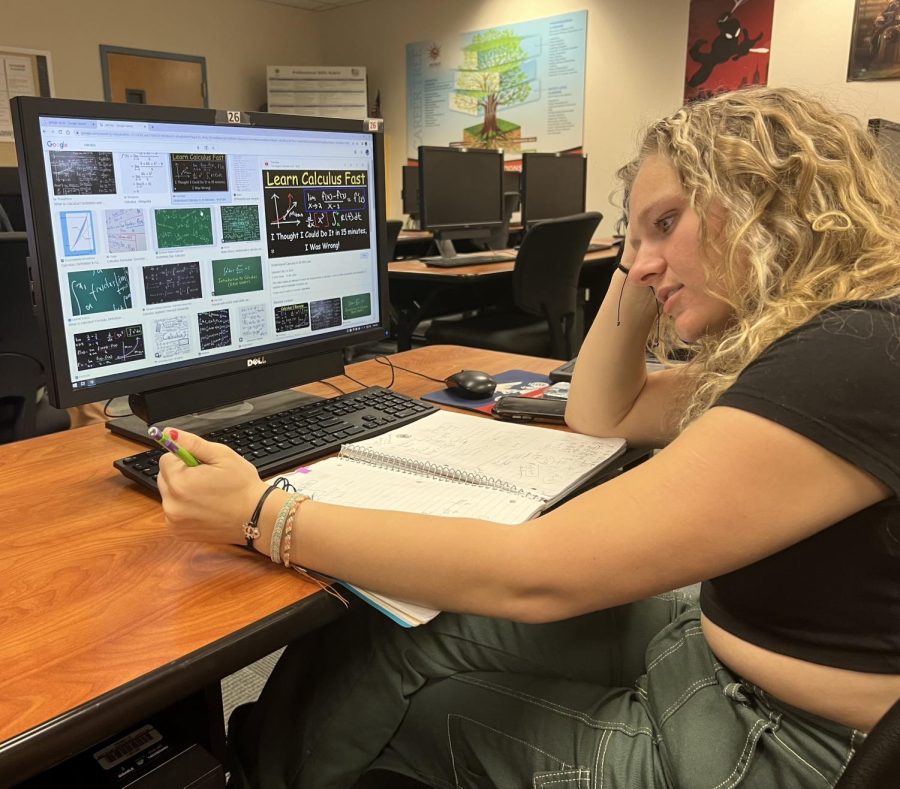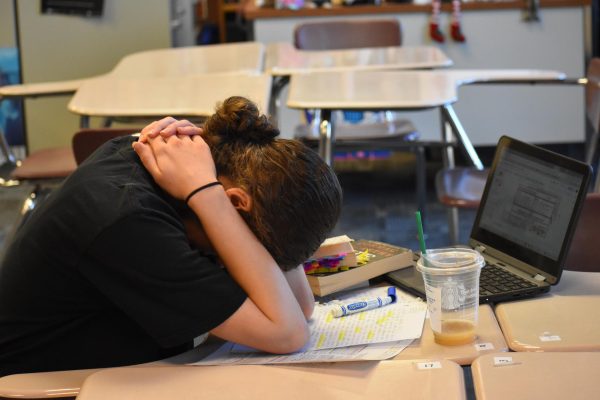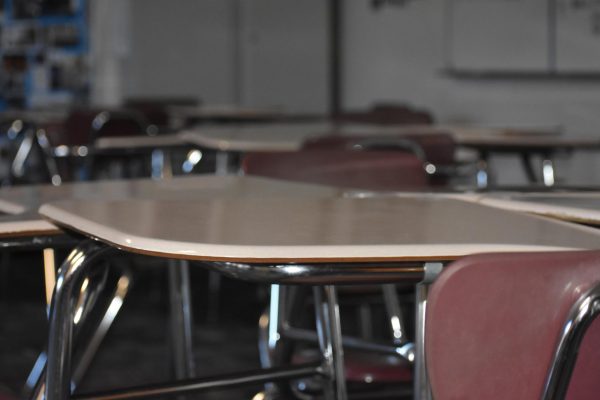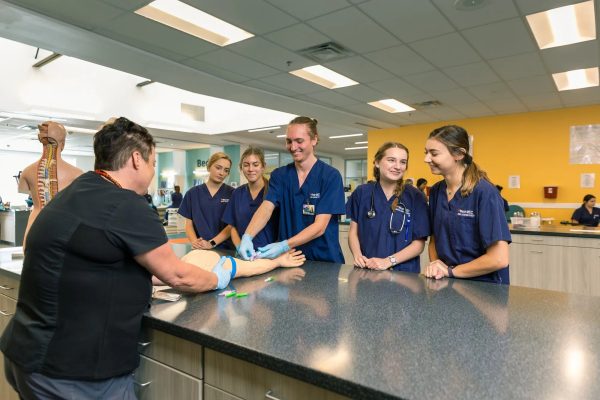To Pre-Calc, or not to Pre-Calc?
A student works diligently on her math homework.
April 18, 2023
Higher level math students have various course options, and with next year’s introduction of AP Precalculus, OHS will offer four Advanced Placement math classes, including AP Calculus AB, AP Calculus BC, AP Statistics, and AP Precalculus. Considering all options, some students are struggling to decide which course is right for them.
Even amongst math department teachers, the route to take in math is widely debated; some teachers at the school advocate for Precalculus as a crucial course to take for the vast majority of students, while others encourage certain excelling students to go straight to Calculus AB after their Algebra 3-4 honors course.
“I really am scared about students skipping Precalculus,” said Andrew Cardon, math department chair. “In very few instances do I think that it’s really a good idea. There’s so much to be gained from Precalculus—it’s such a valuable class.”
Cardon and other teachers believe that Precalculus often acts as a connecting bridge between earlier math courses and Calculus, helping students prepare for the rigorous class.
“I’m not a big proponent of skipping Precalculus and jumping into Calculus. I think it’s something that will be more of a detriment,” said Brad Matson, math teacher. “There’s a lot of information that you learn in a Precalculus class that [a student has learned] in Algebra 3-4, Geometry, Algebra 1-2; [Precalculus] is a review of all of that, and they get the chance to actually learn it at a greater depth than what they did in [Algebra 3-4].”
Even from the student perspective, Precalculus can truly be a beneficial experience.
“I came from an Algebra 3-4 class where I feel like I didn’t really thrive and I got some pretty bad grades in there,” said Arturo Whipple, senior. “I needed that bridge to higher-level thinking to really understand trigonometry and the unit circle. I definitely needed Pre-Calc.”
Most teachers agree that Precalculus does a lot of good for students that need the extra help before moving on to even higher levels of math; however, disagreements start to occur when broaching the idea that many students can skip the class.
“Pre-Calc is needed for students that need a refresher or need more help to build that solid foundation before they move on to Calculus,” said Jeff Williams, math teacher. “You can’t come to Calculus and not be good at algebra and the unit circle, [but] if you are good, then what’s the point of going to Pre-Calc to do it again.”
With most of Precalculus being a review of previous courses, Williams makes the case for it being an unnecessary class for strong academic students, and that going straight into Calculus AB should be viewed as progressing, rather than skipping.
“Nobody’s shown me any difference between 3-4 honors and Pre-Calc other than what I found to be three optional standards. 97% of the curriculum is exactly the same,” Williams said. “When we’re saying [students] are skipping, are they really ‘skipping,’ or are they just reinforcing [skills].”
The repetition of material from previous classes can lead some students stuck in a Precalculus class to feel unengaged, which cannot only cause distractions for other students, but it can also prevent the teacher from giving adequate attention to the students who actually need help.
“It takes away from the teacher’s opportunity to focus on every person who’s struggling. If you have somebody who doesn’t need any help, there’s no reason to have them in [that class],” Whipple said.
Previously a math teacher at Mountain Ridge High School, Williams explains that skipping Precalculus is quite common in most high schools.
“I would be really nervous if this was my idea, but it’s not. I did it for 18 years, the East Valley does it, [too]. I’m not nervous because this is what should be done because this is what other schools do,” Williams said.
With OHS previously being an outlier by not encouraging students to jump over Precalculus, Williams is passionate about the need for change and that not encouraging students to jump to Calculus can harm them in the long run.
“[OHS students] are either not good enough, and we shouldn’t [allow them to] skip, or we’re not [allowing them to skip] and we’re doing them a disservice,” Williams said. “You can’t be in the middle; you either have to say that our kids aren’t as intelligent and not as good in math, or they are and we’re doing them a disservice…in my opinion.”
On the contrary, many other teachers feel that OHS should not idolize and imitate other schools for practices that may not actually be beneficial to all students.
“Sometimes I think schools do things to make the school look good, to make it to where they have a high number of Calculus students. Not necessarily is that the best interest of the students. If a kid is in a Calculus class and they don’t know what’s going on, that’s not going to do the students any favors,” Cardon said.
In past years, OHS has offered an accelerated math class that was a hybrid between Precalculus and Calculus A.
“I really like[d] the semester one Precalculus, semester two Calculus class. I still think we should [still] have it,” Matson said.
Although Matson, who taught the hybrid course, believes that the course was a good alternative to a typical Precalculus class, others in the math department felt that it produced chaos down the line in the class that followed it, Calculus BC.
“When I got here, half the kids [in my Calculus BC class] were those hybrid kids that only got a little fraction of calculus, and the other half were the kids that came from Calculus [AB],” Williams said. “I had to teach that class [at the level of] the lowest person. They weren’t low because they didn’t know how to do it, it was because they hadn’t seen any of that stuff yet.”
Although other math teachers do not agree with jumping over Precalculus, they do recognize the need to help students advance with the subject.
“As opposed to skipping Precalculus, the better option would be to take [an earlier] math class during the summer,” Cardon said. “The best math class to take over the summer is Geometry, it’s the best to learn on your own.”
For any student contemplating skipping Precalculus or any other course, both Cardon and Williams encourage them to discuss things with their current math teacher or go talk to them personally in rooms 605 (Cardon) and 155 (Williams).
“Talk to me, come see me,” Cardon said. “I have been teaching classes at this school forever and I’ve taught just about every class that there is. I know what’s needed to get to the next level.”
Ultimately, it is a positive thing that more and more students are choosing to take rigorous courses, whether it be Precalculus or Calculus.
“Math is solving problems and thinking logically. I think it’s extremely important to have that skill—whether it’s math or dealing with everyday issues,” Matson said.













